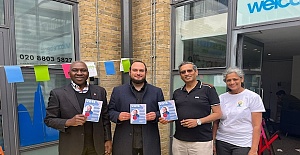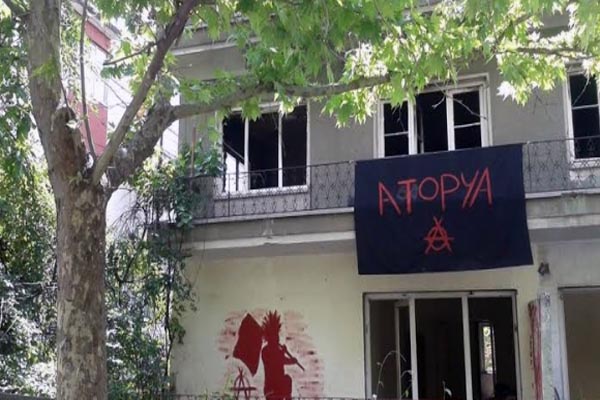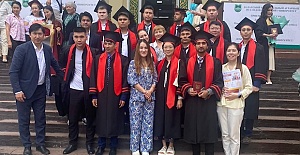The crust of political participation is to ‘do together’ which evolves in the process of defending a cause or a personal gain. ‘New Social Movements (NSM) Activism’ and ‘Civil Society Organisations (CSO) Activism’ belong to New Activism types that today’s youth is showing interest in, and it composes of experiential, concrete and goal oriented mechanisms for political participation. CSO activism defines political activism that focuses on reforms in political public space, that is organized around a single issue, and which occurs in an organized and centralized political network that conducts campaigns based on coalitions. In juxtaposition to this, New Social Activism expresses a form of political organisation that has a loose militant network, that uses communication technologies, that shows ad-hoc organisational features, that owns more than one particular issue and that might have different aims. When we look at the short history of CSO activism in Turkey-one of the two types of activism which have different qualities- it is seen that it has developed since the beginnings of 2000s. The fact that CSOs have proliferated in numbers, gained recognition, and their development due to various reasons in this history, have oriented young people to exist in socio-political engagements. Gezi Park protests that have attracted a high number of participants which took place at the end of May 2013 have signalled that ‘Gezi’ would be a turning point in the history of Turkish civil society. The participants of Gezi protests are mostly young people. In Gezi’s short history, we can see that it carries a lot of the qualities of New Social Movements activism. During the same period, the tension in the political arena started to hamper the relation of CSO’s with the state and the government which eventually led CSOs to adopt a mild and prudent attitude towards them. While non-existence of CSOs in the action scene among social movements since May 2013 have led young people to new social movements and new formations, it has also evolved into a process where people are led to establish formations that offer long term solutions to political participation methods.
Introduction
In this paper, based on which aspects of New Social Movements and Civil Society Organization[1] are agreed as a new modes activism and the expectations of young people from those modes of participation will be discussed. Then, the development of Civil Society Organizations in Turkey and the role of young people in the quest for solution to the social problems will be mentioned. Lastly, the paper will examine the reasons of the late reactions of Civil Society Organizations compared to other units[2] of civil society on the social movements that started on May 2013.
New Modes of Activism of Young People: Civil Society Organizations and New Social Movements Activism
In order to understand new social movements, it is crucial to analyse the concept of political participation. Political participation comprises a wide range from less intensive agencies (voting) to more intensive agencies (being a member of a political organization) (Schildkraut, 2005: 286) Political participation or engagement represent the will of mobilization, which is “doing together” that is developed through the logic of support and demand for material interest or a goal. Then, political participation is an action of taking a stance in the public discussion and so carries a dimension of identity which categorizes themselves and other in the eyes of individuals (Neveu, 2011).
Currently, due to the legitimacy crisis within parliamentarianism and representative democracy, the lack of popularity and support for class based social movements, such as the working class movement, and the contamination of the conventional politics, for young people there are two types of political participation. First one is the classical political participation within the conventional social movements, and the other is protester political participation or “new modes of activism” in a more popular way of saying, which includes two types of activisms, civil society organizations (CSO) and new social movements (NSM) (Galland, 2011: 198).
CSO activism and NSM activism, which generate the two main channels of new modes of activism, should not be confused. The work of Lance Bennett distinguishes between CSO activism and NSM activism. CSO activism is an organized and centralized political activism that focuses on the reforms in the political public sphere, organized within the frame of one single issue, and run campaigns on coalitions within a political network. On the contrary, New Social Movements are defined as grassroots political organizations, which have looser militant network, use communication technologies, embrace more than one issue, and have different goals. Nowadays, according to the sociologists, neither modes of activism are hierarchical; both are human-centric, participatory, and based on post-materialist values (Bennett, 2005: 203).
Around the world, the development of NSM and CSO activism has happened in an era, when traditional social movements cannot fulfil the demands of actors and the political demands are outflew from the conventional political sphere. The main reasons of the emergence of those movements can be considered as the world politics after the Second World War, the generation of 1968 and their demands, the Eastern Bloc and the dissolution of the USSR, the weakening of the working class movements, neoliberal politics followed by the decrease of the strength among the proletariat, and globalization (Neveu, 2011). The development of CSO and NSM activisms enable the emergence of a new citizenship model.
The new type of citizenship has played a crucial role in the political engagement of the young generation. The researchers suggest that the political engagement of the youth, especially after 1990s, is generally shaped around these two modes of activisms (Galland, 2011) American researchers find out that withdrawal from the political engagement, which is developed by the partisanship to political parties, is not happening only among the young but also it is a cultural and historical change that has happened through generations (Galland, 2011: 200). Since 1978, the identity of being a partisan to the political parties has decreased due to the apathy toward political parties. The distance of the youth from politics is not interpreted as the rejection of politics, but the signal of the change in the modes of political organization (Drouin, 1995). Galland (2011: 198) finds that in Europe, voter turnout among the young has decreased and young people have become distanced from the conventional politics. In the same manner, by coining the term of “actively apolitical younger generation,” Beck and Beck-Gernsheim (2003: 159) touch upon that young people neutralize politics by not participating to the institutions, such as old, conventional politics and carry out new participation mechanism.
In other words, the political participation of the young has directed to the movements, which are more “experimental”, abstract and goal-oriented, rather than movements with partisan and syndicalist cadres (Gallad, 2011 and Muxel, 1992). As Anne Muxel (2011: 200) determines, nowadays, young people embrace less normative perspective in their political engagement and allow for more expression. Young people stand individually but jointly against the institutionalized organizations.
Sociologists show that as well as ecologists, who are beyond right-left distinction, anti-capitalists, new anarchic movements; and Islamophobia, xenophobia, new modes of conservatism, and movements based on new ethnic and religious identities are supported strongly by the European youth (Faulks, 1999: 87-103 and Brechon, 2011). It is observed that new modes of political activism are widespread among the young. Different from the conventional political engagement, without being a member of an organization, young people can protest a specific incident by organizing horizontally and internationally thanks to the opportunities that are facilitated with the internet. The factor of “project-based engagement”, serves for highlighting the micro-mobilization within the scope of limited goals. According to Melucci (1995: 41-63), in these modes of activisms “although the action is specific and partial, the actors of the action are interdependent and interacted with each other at the global level and they are extremely aware of this fact.”
The Development of Civil Society in Turkey and the Modes of Organization of Young People
The political inheritance of Turkey is one of the most important elements that affects the development and maturation of the civil society, and the culture of organization. While there had been a young, crowded population with high political engagement until 1980, after the military coup in 1980, the political participation of young people came to a standstill. Due to the limitations of 1982 Constitution and the Law of Associations, during the 1980s, civil organization stagnated among almost all of the segments of the society (Aslandaş, 1995: 3003-316). Those people who witness the punishments of the organized youth or punished personally due to being a member of an organization tabooed an active, organized, political life for the following generation. A number of researches conducted on this issue reveal that parents prefer not to share their political knowledge and even the memories of their political struggle in order to protect the lives of their children (Lüküslü, 2013; Fırat, 2011).
Civil society organizations, which started to develop in 1990s, incrementally increased after 2000. Transnational institutions and organizations, such as the United Nations, have realized the importance of the idea that acting together with the local governments and civil society organizations in order to solve the globalized and chronic problems around the world, and thus those decisions that were agreed in 1992 at Rio affected the development of the civil society in Turkey. Earthquakes in 1999 at Marmara and Kaynaşlı are crucial in terms of the organization of the civil society due to the fact that they were successful at the mobilization of the majority of the population. Search and rescue operations and the organized aid associations increased the interest and trust toward civil society (İçduygu, Meydanoğlu, Sert, 2011: 58). Also, the effectiveness of the initiatives of the civil society to solve of the “unsolvable” Kurdish Issue, the emphasis on the role of the civil society by the decisions that were taken at the United Nations Conference of Habitat II, which was on Placement of People, in 1996 in Istanbul, gave the first signals of the future interest on the civil society (İçduygu et all., 2011).
Moreover, the fact that Turkey started membership negotiations with the European Union since 2005 and a number of legal-especially constitutional- changes in order to fulfil the Copenhagen criteria, which are necessary to become a member, provide relatively a suitable and democratic space for the development and improvement of civil society organizations (İçduygu et all, 2011).
On the other hand, in the same period, civil society organizations have been supported by international grants and funds. Projects of the majority of the civil society organizations have been funded by the grants of many international foundations, primarily by the European Union. Also, the budgets that have been separated for the social responsibility projects, and especially activities and projects of civil society organizations, have been increased by the companies, which have been well known around the world. 2000 onwards, civil society has been developed and CSO environment has been generated with an increased support to CSOs. For instance, as the grants and funds are granted to foundations and civil society organizations, a number of associations and foundations with specializations on different subjects perform projects based on service and advocacy. Some of the institutions engage with advocacy in order to affect the government policies directly, while the others present their successful projects to the government as a model. Moreover, there has been a change among those that receive service and CSOs enlarge their area of effectiveness. CSOs have started to be institutionalized with specialization and there has been an increase in the number of CSOs around the country (Dernekler Dairesi Başkanlığı, 2014).
The support of the society to the development of CSOs through this period is noteworthy. In Turkey, most of the CSOs operate with the status of association or foundation. The most important and permanent resources of those organizations are the volunteers. Donations, whose amount is dependent on the economic balance, and grants and funds, that are shaped by the policies of international institutions put CSOs to trump materially, and constrain the area of service. However, based on the report of volunteerism in Turkey (2013), the support of the volunteers is the only support, which is least affected by the lack of financial situation of the organization and sustains the activities in order to benefit the society, only when the volunteer support is well-administered. Most of the CSOs, which are aware of this fact, initiate additional works in order to get the support of volunteers.
The data on the demographic characteristics of the CSO volunteers is insufficient. It is possible to say that a significant number of volunteers of the CSOs are young people. Although the data on this issue is limited, based on the Volunteering Report in Turkey published by the UN Volunteer Program in 2013, and when we observe the volunteers of Civil Society Organizations, which work large scale in terms of their budgets and activities, such as TEGV (Educational Volunteers Foundation of Turkey), TOG (Community Volunteers Foundation), TEMA (The Turkish Foundation for Combating Soil Erosion, for Reforestation and the Protection of Natural Habitats) and Greenpeace, we find that in those foundations, the majority of the volunteers are young people (Greenpeace Akdeniz, 2014). As we mentioned above, due to the facts that the prominence of organizations ahead parliamentarian system and political parties, an increase in the time and interest for volunteer activities of young people, especially the college students. The increasing interest towards their volunteering activities and their orientation towards a different socio-political engagement is due to the increase of the unemployment rates, and the development, escalation and increased reputation of the CSOs (Türkiye’de Gençlerin Katılımı Araştırması, 2013: 43-53). Also, young people have information on civil organizations, actively participate to those organizations and become a part of social movements thanks to the facts that they can easily facilitate social media and mass communication, and keep pace with the changing world order.
In Turkey, the number of different civil society organizations, which focus on various social movement types[3], has been increasing (İçduygu et all, 2011). Although the participation of Turkish youth to the civil society is low compared to the ratios in Europe (Yentürk et all, 2008), in recent years there has been an increase in the value of CSO activism in terms of the development of Turkish democracy and social development. Young people in Turkey want to take a part in the change as volunteers by personally being a part of projects that present solutions to social problems (Türkiye’de Gençlerin Katılımı Araştırması, 2013: 50) [4].
CSO Activism and NSM Activism in Turkey since May 2013
As Lance Bennett’s definition of CSO activism, which is mentioned above, CSOs that are the subjects of “organized and central political activism that focuses on the reforms in the political public sphere, organized within the frame of one single issue, and run campaigns on coalitions within a political network,” can only work in cooperation with the state institutions. If the state does not cooperate with those organizations, the incumbent increases its control over those organizations, focuses on the prestige of state institutions or incumbent policies rather than the welfare of the society and tries to shape the civil society personally, we cannot observe the realization of CSOs in accordance with its definition.
It is usual that the CSOs, which are considered as the guarantors of democracy, are shaken as the democracy is interrupted. We can confine that Turkey is in an era in which there is increased censorship and pressure on social movements. It is observed that the quest of democracy, which becomes visible with Gezi Park protests, with high levels of participation, started at the end of May 2013 and emphasizes that it rose as a protest against the oppression in Turkey, continues intensely (Bilgiç, Kafkaslı, 2013)[5]. Due to the facts that the protests spread to tens of cities in Turkey, the protests were supra-parties, civil society demanded to use the public space and establishment of local solidarity networks, Gezi protests are considered as crucial signs of political participation after 1980 military coup in terms of Turkish history of the civil society. The majority of the protesters at Gezi protests were the young people. Based on the online survey that was conducted by the researchers at Bilgi University between 3-4 June 2013, while the 3.5% of the protesters out of 3008 people were below 18, 53.6% of the protestors was between the ages of 19 and 30, and 15.9% was between the ages of 31 and 35. Gezi protests are discussed as a model of activism and organization that brought together young people, who came from different political and social backgrounds, and either had not participated protests or had been politically active (Bilgiç, Kafkaslı, 2013:13-15)
At that point, it is important to take into account Erik Neveu, who emphasizes the characteristics of the concept of social movement, in order to analyse the Gezi protests as a social movement (2011: 6) individuals, who participate a social movement, as being a part of the movement collectively, “act together pursuant to a conscious project.” The main idea of those movements is the idea of “acting together for the political or social change that is demanded. Although social movements vary, almost all of those movements begin related to the complex social incidents (Neveu, 2011: 9). Also, collective movements are not phenomena of imitations; they rise with the coinciding with the demands, discontentment, and conscience that have always been in the structure of individuals (Neveu, 2011: 40).
Participants of social movements come together as a result of a specific concern. The collective action is formed consciously. The movement can be shaped as the support of a demand, material or moral interest, or a certain claim. According to Herbert Blumer, this collective mode of statement induces the establishment of “institutions that aim to create a new life order” (Neveu, 2011: 11). This new life order may target deep changes, as well as being formed as a mode of resistance to certain changes that are imposed or proposed.
Lastly, when we recall the definition of NSM and its modes of participation -organizations with a loose network of militants, that organize individually, use communication technologies, embrace more than one issue, have different goals-, we can state that the social movements in Turkey in the last year comply with the NSM activism.
It is possible to conclude that the CSOs cannot position quickly in Turkey, since May 2013, a period in which the social dynamism has increased incrementally. On the other hand, new social movements position themselves to the new developments in a quicker and more organic way. For instance, organizations from the different wings of environmental movement, the movements of LGBTI, feminist, class, and trade unions have abstained neither to be a part of the protests nor express their stances; on the contrary they all have become the parts of the voice of the protests. Moreover, during the protests a number of these kinds of civil groups and entities has undertaken the representation of masses and negotiated with the Prime Minister. Most of them have displayed their stances in the protests by organizing quickly, joint public statements, proclamations to the websites and etc. CSOs, on the contrary, preferred to embrace a more cautious stance during the same protests and the same period. It is observed that the CSOs had difficulties to take a stance against the rapid change in the agenda and keep pace with the new situation. CSOs declared that they were concerned about the anti-democratic practices, but their declarations were late and had a more cautious language compared to the other entities and movements. For example, TOG, which is specialized on the studies on youth and has a significant number of researches on young people, released a statement that emphasized their concern on the protests on their website ten days after the protests. Investigating the reasons of this situation would contribute substantially to the researches on civil society. However, still it is possible to assume that one of the most important reasons of this issue relies on the ontological reasons of CSOs. As their legal entities and activities’ dependence on state institutions increases (controls, legal gaps that may be used against the CSOs, necessary permissions for activities etc.), the relations of CSOs with the state and the incumbent, which manages the CSOs, would be deteriorated. One of the most prominent examples of this is the incident that Ministry of National Education repealed unilaterally the protocol, which caused Teachers Academy Foundation(Öğretmen Akademisi Vakfı), sponsored by Garanti Bankası, to stop its activities (Eğitim tercihi 2014; Öğretmen, 2014).
It can be asserted that during social movements continued since May 2013 young people were inclined to new social movements and new entities due to the absence of CSOs during the protests. On the other hand, it should be emphasized that thanks to different platforms and the forums that sustained during and after the Gezi protests, young people learnt how to mobilize and organize. The improvement of political participation encourages a number of new CSOs. It is observed that some of those groups tend to establish entities, which are different from NSMs with dispersed and instantaneous modes of actions by presenting long-run solutions for a limited number of issues. The most important examples of this are the initiatives, such as Oy ve Ötesi (2014) and Sandık Başındayız (2014), whose volunteers come together in order to prevent the electoral fraud in the big cities during the local elections on March 2014. Although the number of volunteers was 150 primarily; it increased to 29000 volunteers on the Election Day. Those initiatives are remarkable due to the facts that they were well studied on the organization scheme, were established in order to make the election system more transparent, to bring an alternative model to the system by introduction of new organisms rather than an election campaign ran by the state.
Concluding Remarks
To conclude, it is observed that CSOs, which take an important place in the history of Turkey in terms of democratization, social welfare and development, and carry out activities, such as services and support for social benefit, with their volunteers and members, have being passed a turning point in the period started with the Gezi protests. In the future studies, it would be appropriate to analyse the effects and changes of this turning point on CSO and NSM activisms, and the changing dynamics of volunteers and activists. On the other hand, increased political participation during this period is promising in terms of the enrichment and variation of the CSO and NSM activisms, which are considered as the new modes of new activisms, and contribution to the social democratization.
Duygu Güner, Koç University Social Impact Forum, Project Specialist
Güner D. (August, 2014), “New Modes of Activism of Young People: Civil Society Organizations and New Social Movements Activism”, Vol. III, Issue 9, pp.31-44, Centre for Policy and Research on Turkey (ResearchTurkey), London, ResearchTurkey. (http://researchturkey.org/?p=6674)
Endnotes
[1]Before starting this paper, it should be emphasized that independent from the discussion between the terms of “Sivil Toplum Kuruluşları” or “Sivil Toplum Örgütleri,” the term of “Sivil Toplum Kuruluşları” (Civil Society Organizations) is used. The terms of CSO is an ad-hoc category that is established on delicate basis and responds to the international organizations and the changing interests of states, which invest to those organizations. CSOs have as many definitions as the number of international organizations, which have the competence to accredit the definitions based on their own interests.
[2] The difference is that: Civil Society Organizations are establishments that are recognized by the state, dependent on the General Directorate of Foundations or the Department of Foundations. However, new social movements, initiatives, platforms may not be recognized by the state formally. Other units of civil society are formed by the groups, such as new social movements, platforms, collectives and trade unions etc.
[3] The types of social movement according to McKinsey: Knowledge Development; Product and Service Development and Delivery; Capacity Enhancement and Skills Development; Behaviour Change Programs; Enabling Systems and Infrastructure Development; and Policy Development and Implementation
[4] Based on the report, 27% of the young people are determined as the member of volunteer of civil society organizations. However, among them, approximately 10% of those are members of trade associations. Most of the trade associations are not counted as civil society organizations due their goal of existence and structures.
[5] Esra Ercan Bilgiç, Zehra Kafkasli, Gencim, Özgürlükçüyüm, Ne İstiyorum? (I am Young, Libertarian, What Do I Want?) Based on the report on the results of the survey of #direngeziparki; 92.4% of 3008 people, who participated the survey, strongly agreed that the “authoritarian attitude of the Prime Minister is effective.”
References
Aslandaş, A. (1995) 1980 Sonrasında Dernekler, in Cumhuriyet Dönemi Türkiye Ansiklopedisi, 12. Cilt, 303-316, İstanbul: İletişim Yayınları.
Beck, U. ve Beck-Gernsheim E., (2003) Individualization:Institutionalized Individualism and its Socail and Polical Consequences,Londra/Thoussand Oaks/New Delhi: Sage Publications.
Bennett W.L. (2005) Social Movements beyond Borders: Understanding Two Eras of Transnational Activism”, Della Porta, D., Sidney, T. (eds.) Transnational protest and global activism,Lanham, MD: Rowman and Littlefield.
Bilgiç, E. ve Kafkaslı, Z. (2013) Gencim, Özgürlükçüyüm, Ne İstiyorum? #direngeziparki Anketi Sonuç Raporu, İstanbul: İstanbul Bilgi Yayınları. (also http://www.bilgiyay.com/Content/files/DIRENGEZI.pdf).
Bréchon P. (2001) Moins politisés, mais plus protestataires, içinde Roudet G. (dir.), Les Valeurs des jeunes. Tendances en France depuis 20 ans, coll. “Débats Jeunesses”, Marly-le-Roi-Paris: INJEP-L’Harmattan.
Drouin V. (1995) Enquetes sur les générations et la politique 1958-1995, Paris: L’Harmattan Publications.
Faulks K. (1999) Political Participation, Political Sociology, New York: New York University Publications.
Fırat, D. (dir) (2011) Bir Kollektif Bellek Çalışması:12 Eylül, BEKS (Bellek ve Kültür Sosyolojisi Çalışmaları Derneği) Araştırması.
Galland O. (2011) La Sociologie de la Jeunesse, Paris : Armand Colin Publications.
İçduygu, A., Meydanoğlu Z ve Sert, D., (2011) Türkiye’de Sivil Toplum: Bir Dönüm Noktası, CIVICUS Uluslararası Sivil Toplum Endeksi Projesi Türkiye Ülke Raporu II, İstanbul: TÜSEV Publications.
Konda Araştırma ve Danışmanlık, (2013) Türkiye’de Gençlerin Katılımı Araştırması, İstanbul:İstanbul Bilgi Üniversitesi, Şebeke Gençlerin Katılımı Projesi Kitapları – No: 3.
Lüküslü, D. (2013) Türkiye’de Gençlik Miti: 1980 sonrası Türkiye Gençliği, İstanbul: İletişim Yayınları,
Melluci A. (1995) The Process of Collective Identity, içinde Johnston, H., Klandermans, B. (eds) Social Movements and Culture, 41-63, Minneapolis: Minnesota University Publications.
Muxel, A (1992) L’age des choix politiques. Une enquête longitudinale auprès des 18-25 ans, in Revue Française Sociologie, 33-2, 233-263. ; 2001, L’expérience politique des jeunes, Paris : Presses de Sciences Po.
Muxel, A. (2011) Avoir 20 ans en politique, in Olivier Galland O. La Sociologie de la Jeunesse, Paris : Armand Colin Publications.
Neveu, E. (2011) Sociologie des Mouvements Sociaux, Paris: La Découverte Publications.
Schildkraut, D. (Eylül 2005) The Rise and Fall of Political Engagement among Latinos: The Role of Identity and Perceptions of Discrimination, Political Behavior, vol. 27, No. 3: Springer. Also can be reached from the following link: http://www.jstor.org/stable/4500197
Türkiye’de Gönüllülük Raporu (2013) UN Volunteers ve Gençlik Servisleri Merkezi.
Yentürk, N., Kurtaran, Y., Uyan, Ş., Yurttagüler, L., Akyüz, A. Ve Nemutlu, G. (2008) İstanbul Gençliği: STK üyeliği bir Fark Yaratıyor mu?, İstanbul: İstanbul Bilgi Üniversitesi Gençlik Çalışmaları Birimi Yayını.
Dernekler Dairesi Başkanlığı, Derneklere ilişkin çeşitli grafik ve tablolar, update information on 23.09.2013.
http://www.dernekler.gov.tr/tr/AnasayfaLinkler/dernekler-grafik-tablo.aspx accessed on 08.06.2014.
Eğitim Tercihi, http://www.egitimtercihi.com/gundem/10100-sosyal-medyada-orav-a-destek-kampanyasi.html, accessed on 21.04.2014
Greenpace Akdeniz, http://www.greenpeace.org/turkey/tr/, accessed on 08.06.2014
Oy ve Ötesi, http://www.oyveotesi.org/, accessed on 08.06.2014
Öğretmen, http://www.ogretmen.web.tr/guncel/meb-capulcularla-protokolu-uzatmiyor-h3998.html, accessed on 21.04.2014
Sandık Başındayız, https://www.sandikbasindayiz.org/, accessed on 08.06.2014
Toplum Gönüllüleri Vakfı (TOG), http://www.tog.org.tr, accessed on 08.06.2014
Türkiye Eğitim Gönüllüleri Vakfı (TEGV), http://www.tegv.org/gonullulerimizlegerceklestirdiklerimiz, accessed on 08.06.2014
Türkiye Erozyonla Mücadele Ağaçlandırma ve Doğal Varlıkları Koruma Vakfı (TEMA), http://www.tema.org.tr/web_14966-2_1/neuralnetwork.aspx?type=150, accessed on 08.06.2014



 Advice for Enfield residents ahead of the General Election
Advice for Enfield residents ahead of the General Election Sunak promises tax cuts, economic stability, Conservative Party election manifesto
Sunak promises tax cuts, economic stability, Conservative Party election manifesto Ertan Karpazli, an independent MP candidate for the Enfield North constituency
Ertan Karpazli, an independent MP candidate for the Enfield North constituency Rishi Sunak announces a general election in a statement outside Downing Street
Rishi Sunak announces a general election in a statement outside Downing Street Residents of Spanish island of Mallorca launch initiative to thank tourists amid protests over mass tourism
Residents of Spanish island of Mallorca launch initiative to thank tourists amid protests over mass tourism Srebrenica Remembered, Lessons for Justice and Peace! YEE London held a reflective event
Srebrenica Remembered, Lessons for Justice and Peace! YEE London held a reflective event British Premier Keir Starmer to reset UK-EU relations with high-profile meetings
British Premier Keir Starmer to reset UK-EU relations with high-profile meetings Voters head to polls for UK general election
Voters head to polls for UK general election The Swiss official will take charge of the match between Real Madrid and Atalanta in Warsaw
The Swiss official will take charge of the match between Real Madrid and Atalanta in Warsaw Applications are now open for Walking and Cycling Grants London until 9 September 2024
Applications are now open for Walking and Cycling Grants London until 9 September 2024  Two Circles also appointed as exclusive media sales agency for UEFA Women’s Champions League
Two Circles also appointed as exclusive media sales agency for UEFA Women’s Champions League  England manager Gareth Southgate has resigned two days after defeat by Spain
England manager Gareth Southgate has resigned two days after defeat by Spain Joyce and Snell's planning application gets stamp of approval
Joyce and Snell's planning application gets stamp of approval The amount of bounce back loans fully repaid is just %13
The amount of bounce back loans fully repaid is just %13 Petrol prices higher than they should be, says RAC
Petrol prices higher than they should be, says RAC UEFA and Mastercard renew UEFA Champions League partnership
UEFA and Mastercard renew UEFA Champions League partnership


















